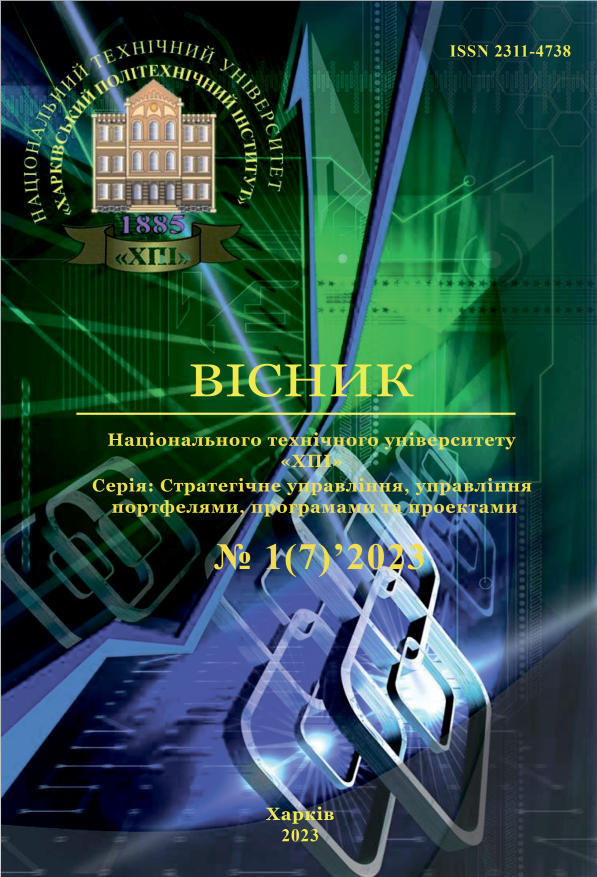DEVELOPMENT OF A KNOWLEDGE BASE ON THE INTEGRATION OF PROJECT MANAGEMENT METHODOLOGIES
DOI:
https://doi.org/10.20998/2413-3000.2023.7.11Keywords:
: project management, project management methodology, knowledge base, synthesis of project management approach, adaptation of project management methodology, agile project management methodology.Abstract
In the context of global disruptions caused by pandemics, massive armed conflicts, and other destructive factors, the economic sector requires a reevaluation of paradigms and the application of new approaches and tools for project management. Risk management, as a component of the management system, is undergoing transformation in a state of perpetual uncertainty and turbulence. Project management methodology, as a means of achieving defined goals, cannot be solely based on predictable attributes and must provide flexibility in response to dynamic changes in the external and internal environment. The rapid pace of digital transformation is shaping a new understanding of the digital space, its content, automation tools, and information support. The rapid development of information technologies based on artificial intelligence and the intensive migration of production and management processes to remote forms necessitate business adaptation to new conditions and effective application by project managers. The information field is overloaded with various project management methodologies, a large amount of derivative and secondary information characterized by a lack of clear structure and low practical value. The continuous transformation of the modern environment requires scientific research to explore the development and adaptation of flexible and hybrid approaches to project management by use of modern information systems. The purpose of this article is to develop a concept of integrating project management methodologies with the resources of a corporate knowledge base. The article explores current knowledge in project management methodology through the genesis and analysis of document interrelationships, which allows for the identification of dependencies and potential synergistic effects of such methodologies. Integration methods and components of these methodologies are analyzed, revealed, and complemented to ensure effective project management. A concept is developed to facilitate a creative approach to project management with an interactive system for accumulation, structuring, implementation, retrospective, and adaptation of accumulated knowledge regarding project management approaches within an enterprise. Principles for constructing a corporate knowledge base on project management methodologies are formulated, and approaches to applying accumulated knowledge are discussed. The proposed tool is implemented with the support of modern information systems, enabling the application of adaptive, valid, and effective project management methods tailored to individual project requirements. The conclusion is drawn that the proposed concept of a corporate knowledge base, combined with existing methods of integrating project management methodologies, is a promising foundational tool for implementing a creative and proactive approach to project management.
Downloads
Published
Issue
Section
License

This work is licensed under a Creative Commons Attribution-NonCommercial-ShareAlike 4.0 International License.
Our journal abides by the Creative Commons copyright rights and permissions for open access journals.
Authors who publish with this journal agree to the following terms:
Authors hold the copyright without restrictions and grant the journal right of first publication with the work simultaneously licensed under a Creative Commons Attribution-NonCommercial-ShareAlike 4.0 International License (CC BY-NC-SA 4.0) that allows others to share the work with an acknowledgement of the work's authorship and initial publication in this journal.
Authors are able to enter into separate, additional contractual arrangements for the non-commercial and non-exclusive distribution of the journal's published version of the work (e.g., post it to an institutional repository or publish it in a book), with an acknowledgement of its initial publication in this journal.
Authors are permitted and encouraged to post their published work online (e.g., in institutional repositories or on their website) as it can lead to productive exchanges, as well as earlier and greater citation of published work.

